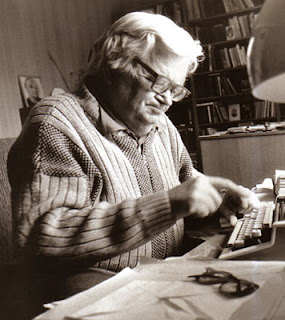Unattributed illustration from Bonch-Bruyevich’s Lenin and the Children (1975) / Image courtesy of e-Reading
From “Christmas” (1985)
by Timur Kibirov
7
… Yet the Son slept
a sweet sleep, and over His brow
streamed the light from last night’s
8
Star, blending with the radiance
of the scarlet dawn.
Free from anger or sadness,
bubbles formed on
those Lips that yet again would
give the Good News, that would
grimace and spit blood
and praise the merciful Lord…
9
But the news spread, and rumor
filled the world.
At last it reached the Kremlin,
our Russian stronghold.
And the tall blue firs rustled!
The cannon fired for the first time!
A watchman recoiled in terror!
And then from the mausoleum
10
he came. He climbed into the car.
Iron Felix sat beside him.
Behind the wheel was the “Sailor,”*
staring down anyone they passed.
They flew faster than the wind.
They drove up. They knocked.
A smile beamed
from the face of Ilyich.
He had come with New Year’s gifts:
the Peace Decree, saccharin,
a copy of the Great Initiative,
the log he’d hauled at the work party,
11
first-rate provisions, and a bouquet
of white paper roses,
just as alluring and bright
as our poet Blok evoked them.
A bust of Marx, a pioneer scarf,
a packet of blank arrest forms,
the 3rd Congress of the Komsomol,
and a bayonet from the Red Guard.
12
They left the Sailor standing
at the door. They went in.
No sooner had they seen Him
than they became bewildered
and backed away in terror.
Their faces grew pale. They trembled
and dissolved in the air… The Sailor
instantly toppled off the porch
and sprawled out like a worm.
But listen! Already, the horns
13
of battle have begun to sound
from far off in the distance.
Our armor is strong! Our hand
is firm! Our fury is righteous!
The sky quakes with thunder —
propeller, sing your furious song!
And now an NKVD squad
has got the place surrounded…
Translated from the Russian by Jamie Olson
______________
* Anatoly Grigoryevich Zheleznyakov (1895-1919), also known as “Sailor Zheleznyak,” was an anarchist, seaman in the Baltic fleet, and one of the leaders of the Bolshevik revolution in 1917. During the Russian Civil War, he commanded a brigade of armored trains and died from a chest wound sustained in a battle against White army troops in Ukraine.







